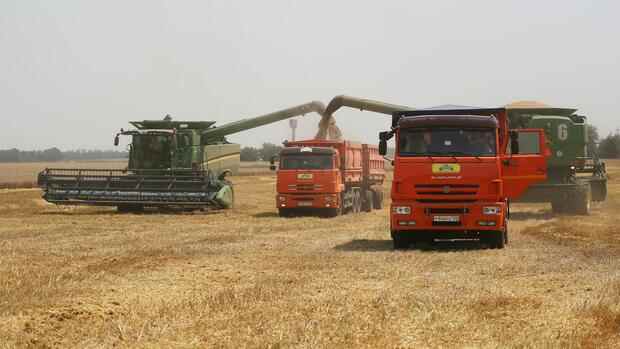Brussels It is another big drama that is currently emerging in world politics: Since Ukraine, one of the largest wheat exporters in the world, can no longer supply numerous countries due to the Russian war of aggression, there is a risk of food shortages. This particularly affects the fragile countries of the Middle East and North Africa.
For example, Lebanon gets 60 percent of its wheat needs from Ukraine. Since the wheat warehouse was destroyed in the big explosion in the port of Beirut in 2020, the country can only store wheat for a month’s needs – and is therefore dependent on continuous deliveries.
According to observers, Russia has the potential to destabilize the world over the food issue. 80 percent of grain exports leave the country via the Ukrainian ports – if Russia bombs the ports, as is currently the case, this will have a corresponding effect on exports. In addition, according to Ukrainian sources, Russia is destroying warehouses, hijacking ships loaded with grain and mining agricultural land. Some of the information is difficult to verify, but Western experts believe it is credible
Ukraine’s Agriculture Minister Roman Leshchenko said on Tuesday before the European Parliament’s Agriculture Committee, where he was speaking: “We have no way of doing our sowing as usual.” Ukraine is doing its best. “We try to deliver what we can deliver.” That won’t be much: Most farmers fight in the army and therefore cannot till the fields. Exports are also hardly possible logistically: the airspace is closed.
Top jobs of the day
Find the best jobs now and
be notified by email.
Rail freight is needed for the military and to get fleeing Ukrainians out of the country. Last but not least, the country also needs the food for itself. Leshchenko said: “Ukraine has no choice. It must limit exports to ensure its survival.”
Food shortages in many countries
In addition to the Ukrainian delivery failure, Russia is also causing food shortages in many countries: Moscow announced in mid-March that it would restrict the export of wheat, barley, rye and other grains.
A problem for Turkey, Egypt and numerous countries in central and southern Africa, which obtain more than half, sometimes even 80 percent, of their wheat imports from Russia. There is a risk of unrest and further streams of refugees.
In addition, there is a danger that many governments in Asia or Africa could be politically blackmailed by Moscow, since they fear starvation in their own country if Russia were to stop grain exports.
Ukraine is one of the largest wheat exporters in the world.
(Photo: imago images/ITAR-TASS)
CDU politician Norbert Lins, chairman of the European Parliament’s Agriculture Committee, says: “Putin is able to exploit the hunger of other countries and use it as a weapon.” Politically targeted famines have always been a weapon of war. The United Nations declared it a war crime in a 2018 resolution.
EU Commission sets up aid package for European farmers
So far, the demand and supply of grain products on the world market have been roughly balanced, this year there will be a shortage of 25 million tons. The EU now wants to try to close the global food gap as much as possible.
This is “of fundamental importance from a geostrategic point of view,” writes the EU Commission in a communication on food safety that it is presenting this Wednesday. The Handelsblatt has a leaked draft of the political paper.
The EU is a net exporter of wheat. In order to increase production even further, the Commission now wants to set up an aid package for farmers amounting to 500 million euros.
“We also have a global responsibility,” says MP Lins in this regard. “Europe could meet the import needs of three Middle Eastern countries.”
However, the EU actually wanted to switch to less intensive agriculture as part of the Green Deal climate and environmental package. To this end, the use of fertilizers and pesticides should be halved over the next few years, and more agricultural land should be laid fallow for species protection reasons.
The result: Less food would be produced in the EU. Studies speak of a minus of 13 percent. The Commission originally wanted to present corresponding legislative proposals this Wednesday, but has now postponed this project indefinitely.
Farmers are allowed to deviate from environmental targets
In addition, the Commission issues a regulation that allows Member States to temporarily deviate from certain environmental targets. For example, they can allow their farmers to cultivate their fallow land as they wish and still pay out the corresponding environmental funds.
This approach is not well received by Green politicians. “The fact that ten percent of the world’s population is already starving today is mostly due to structural reasons, such as poverty, distribution problems, lack of access to land,” write agricultural politicians Martin Häusling and Renate Künast in a paper on the effects of the war in Ukraine on food supplies. These problems would not be solved by ramping up production in Europe.
Instead, it makes more sense to limit the consumption of animal foods so that less agricultural land is required for animal feed. Grain cultivation for biofuels must also be put to the test. “70 percent of the raw materials produced on agricultural land in Europe end up in tanks or troughs,” write Häusling and Künast.
Meanwhile, the Ukrainian Minister of Agriculture Leshchenko also had a suggestion for EU politicians: He asked them to set up green corridors through which foodstuffs could be transported from Ukraine to Africa in an unbureaucratic manner. “It’s also in your interest,” he campaigned, and then said quite directly: “You’ll get fewer refugees then.”
More: Russia’s grain export ban is forcing the food industry to innovate
